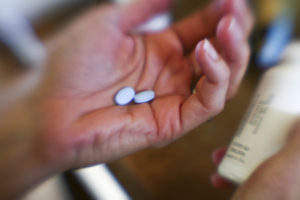Diabetes Drugs Linked to Heart Failure and Death
Posted in Health & Wellness on April 16, 2015
Diabetics taking certain DPP-4 inhibitors should be warned about an increased risk of heart failure and death, says an advisory committee to the U.S. Food and Drug Administration. The panel concluded that diabetes medications Onglyza® and Nesina® should have their labels updated to include safety warnings based on recent studies.
DPP-4 Inhibitors Linked to Heart Failure
The FDA requires all applicants of new diabetes drugs to show that their product will not result in an “unacceptable increase of cardiovascular risk.” Documents released ahead of the FDA review indicated that AstraZeneca’s diabetes drug Onglyza (saxagliptin) is associated with a 27% increase risk of heart failure and a potential increased risk for death.[1] Data for Takeda Pharmaceutical’s Nesina (alogliptin) also showed a modest increase of these risks.[2] The studies, which were presented to the committee on April 14, 2015, raised new concerns over DPP-4 inhibitors, a class of diabetes medications that have been linked to serious side effects and patient harm.
What are DPP-4 Inhibitors?
Some people with type 2 diabetes do not make enough of a hormone called incretin. Dipeptidyl peptidase-4 (DPP-4) inhibitor medicines help the body to retain existing incretin for a longer time. This triggers insulin to be released, which lowers blood sugar. Another DPP-4 inhibitor called Januvia (sitagliptin) is still awaiting review, as Merck Pharmaceuticals has yet to release its post-market study. However, some panelists felt that heart failure and death could be a class-wide problem.
Diabetes Drugs are big business
Approximately 9.3 percent of the U.S. population has a diagnosis of diabetes, and another 37 percent have pre-diabetes.[3] People with diabetes may develop serious complications such as heart disease, stroke, kidney failure, blindness, and premature death. Without intervention, prediabetes will likely develop into type 2 diabetes in 10 years or less. What does this mean for Big Pharma? Last year, global sales of the combined diabetes franchise of Januvia/Janumet (which contains the popular type-2 diabetes drug metformin) reached $5.7 billion.
While the research and the panelists’ recommendations may seem compelling, it is important to remember that the FDA is not required to follow the advice of its advisory panels.
Source:
“FDA Panel Backs New Safety Warnings on Two Diabetes Drugs” by Alicia Ault, Medscape Medical News, April 14, 2015.
[1] Scirica BM, Bhatt DL, Braunwald E, et al. Saxagliptin and Cardiovascular Outcomes in Patients with Type 2 Diabetes Mellitus, N Engl J Med 2013;369:1317-26. DOI: 10.1056/NEJMoa1307684 http://www.nejm.org/doi/pdf/10.1056/NEJMoa1307684
[2] . White WB, Cannon CP, Heller SR, et al. Alogliptin after acute coronary syndrome in patients with type 2 diabetes. N Engl J Med 2013;369:1327-35. http://www.nejm.org/doi/pdf/10.1056/NEJMoa1305889
[3] National Diabetes Statistics Report: Estimates of Diabetes and Its Burden in the United States, 2014. Atlanta, GA: US Department of Health and Human Services; 2014. http://www.cdc.gov/diabetes/pubs/statsreport14/national-diabetes-report-web.pdf
